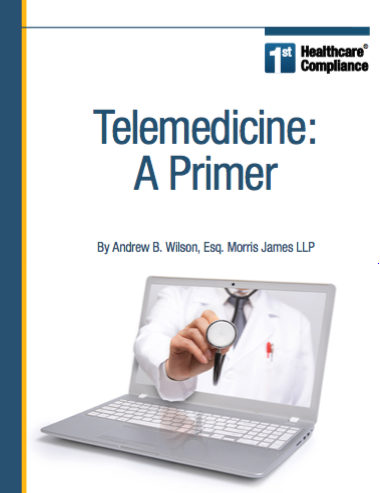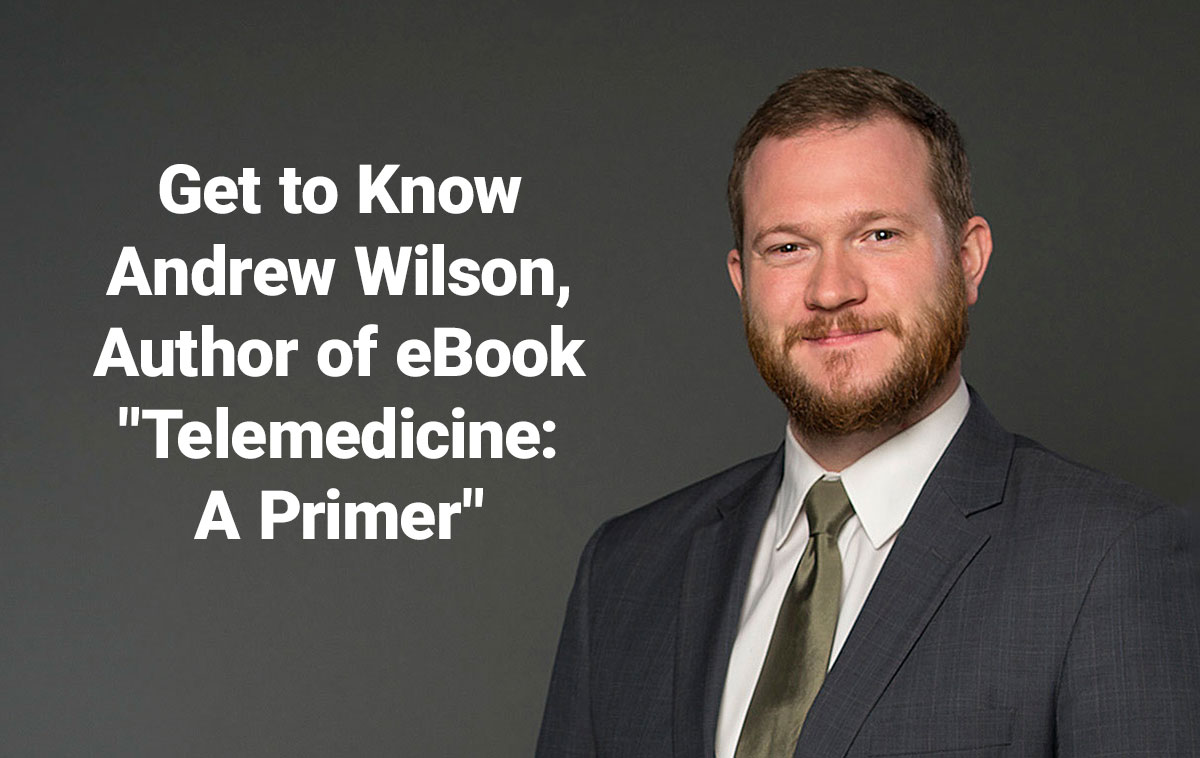Get to Know Andrew Wilson, Author of eBook “Telemedicine: A Primer”
Our latest eBook, Telemedicine: A Primer author Andrew Wilson is a healthcare attorney and legislative specialist at Morris James LLP. Drew assists clinicians and their practices with licensing, business formation and expansion, and regulatory compliance. He is a nationally recognized speaker on telehealth, spearheading Delaware’s groundbreaking telehealth legislation. His most recent legislative coup was passage of a bill increasing reimbursement rates for Delaware’s primary care physicians. Drew is recognized by his peers in Delaware Today for his government affairs and healthcare practices, and was the top vote-getter in both categories in 2018. Last year, he was identified by Delaware Today as a rising star in its 40 Under 40 category.
Q: What words of advice would you give to a practice that is hesitant to integrate telemedicine into their day-to-day?
A: Medicine is shifting under our feet nearly every day, with a macro-push from Fee for Service to Fee for Value. In the next iteration of payments, practices will be reimbursed not only for what they do, but for the very health of their patients. While the landscape now can seem daunting and complicated to build a telemedicine program, the early adopters of telemedicine (which also includes remote patient monitoring) will see major dividends when it comes to adopting – or being compelled to adopt – risk-based contracting. To be certain, the practices who will be ahead of the curve as the shift continues will be the ones who have the infrastructure and culture in place to follow patients outside of the four walls of the practice.
Q: What first drew you to health policy and government relations?
A: My practice and passion has always started with policy. How to make healthier people. How to help the practice of medicine evolve in the 21st century to meet the peoples’ needs efficiently and effectively while lowering costs. Connecting with, and translating for, practices that are doing all they can to meet the needs of their patients on a day-to-day basis while trying and staying appraised of opportunities and demands has been rewarding for both myself and my clients.
Q: Telemedicine seems so futuristic and otherworldly, tell us something about yourself that really grounds you to the today.
A: I grew up in rural America, without access to a lot of the infrastructure that most people take for granted. I was six miles down a dirt road. The closest grocery store was forty minutes away. Power outages were common. We heated the house with a wood stove. The school I attended was K-6, with about nineteen kids in two rooms; in first grade I was the only first grader. Remembering that disconnectedness keeps me realistic about adoption of new things, but also optimistic as I remember the needs of communities like those.
Q: So when you think “telemedicine” you think about rural communities?
A: Great question! I don’t, actually. I think about how helpful it would be TO rural communities, but that’s another mindset we need to abandon. Especially large payers like Medicare. Really, I think about it like “barriers.” A bedridden patient in pain has as much trouble making it to see their doctor down the street as a moderately-healthy rural person who lives half an hour or more from their point of care. In every other corner of the market, we’ve seen a move to bringing services to the time-strapped consumer no matter where they’re located. Medicine should be no different.
Q: Where do you think telemedicine/telehealth is headed next?
A: Right now everything thinks of telemedicine as something “else.” Something outside of healthcare and care delivery. Maybe even just a flash in the pan. And to some extent they’re right: telemedicine is largely reaching maturity outside of the usual continuity of care system. However, much like with cell phone use itself, I’m confident that the “otherness” of telemedicine will, in the span of just a few years, evaporate. It will integrate into the usual course of care, so ubiquitous practices will forget that there was ever a question if telemedicine would be right for them.
Morris James LLP is a full-service law firm with 70 lawyers located in six offices throughout the state of Delaware. These formidable lawyers are deeply committed to anticipating the needs of clients through innovation and superior client service. A clients-first philosophy, multi-disciplinary approach, and collective experience earn them high regard from clients, peers, and the Delaware community. Morris James lawyers combine interdisciplinary legal skills and experience with a passion for knowledge of the client’s business to provide sophisticated legal counsel. They are often viewed in a general counsel-type role, applying a versatile skill-set to serve the increasingly complex and interrelated business, tax, borrowing, real estate, employment, commerce, transactional, and regulatory and strategic transition planning needs.
 Be sure to take a moment to check out Andrew’s downloadable eBook, Telemedicine: A Primer, and view or listen to the audio of his past webinar with us, “Telemedicine Compliance Primer – Using Delaware as a Model” in podcast or on YouTube.
Be sure to take a moment to check out Andrew’s downloadable eBook, Telemedicine: A Primer, and view or listen to the audio of his past webinar with us, “Telemedicine Compliance Primer – Using Delaware as a Model” in podcast or on YouTube.


